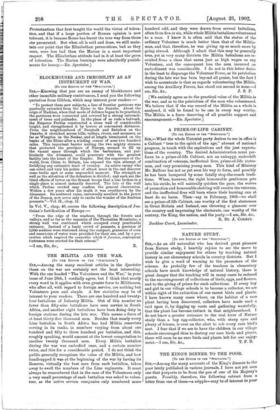THE MilITIA AND THE WAR.
[TO THE EDITOR OP THE "SPECTATOR.") Sur,—Among the many excellent articles in the Spectator those on the war are certainly not the least interesting. With the one headed " The Volunteers and the War," in your issue of June 28th, I cordially agree, but I think that nearly every word in it applies with even greater force to Militiamen, who after all, with regard to foreign service, are nothing but Volunteers pure and simple. A few statistics may be of interest to your readers. There are one hundred and twenty- four battalions of Infantry Militia. Out of this number no fewer than fifty-nine battalions have seen service in South Africa, and another eight battalions have been doing duty in foreign stations during the late war. This means a force of at least thirty-five thousand men. Besides that nearly every Line battalion in South Africa has had Militia reservists serving in its ranks, in numbers varying from about one hundred and fifty to three hundred per battalion, and this, roughly speaking, would amount at the lowest computation to another twenty thousand men. Every Militia battalion during the war was embodied once, and a certain number twice, and this for a considerable period. I do not think the public generally recognises the value of the Militia, and how handicapped it was at the beginning of the war by having its Reserve, virtually the best men from each battalion, taken away to swell the numbers of the Line regiments. It must always be remembered that in the case of the Volunteers only a very small percentage of each battalion was asked to volun- teer, as the active service companies only numbered some
hundred odd, and they were drawn from several battalions, often from five or six, while whole Militia battalions volunteered to a man. I know it is often said that the status of the ordinary Volunteer is much better than that of the Militia- man, and that, therefore, he was giving up so much more by going abroad. Although I admit that this may be generally true, yet in very many districts the Militia battalions are re- cruited from a class that earns just as high wages as any Volunteer, and the consequent loss the men incurred on embodiment was considerable. I do not in this letter desire in the least to disparage the Volunteer Force, as its patriotism during the late war has been beyond all praise, but the fact I wish to accentuate is that as regards volunteering the Militia, among the Auxiliary Forces, has stood out second to none.—I
[We entirely agree as to the practical value of the Militia in the war, and as to the patriotism of the men who volunteered. We believe that if the war record of the Militia as a whole is analysed, it will be found to be one in every way worthy. The Militia is a force deserving of all possible support and encouragement.—ED. Spectator.]






































 Previous page
Previous page